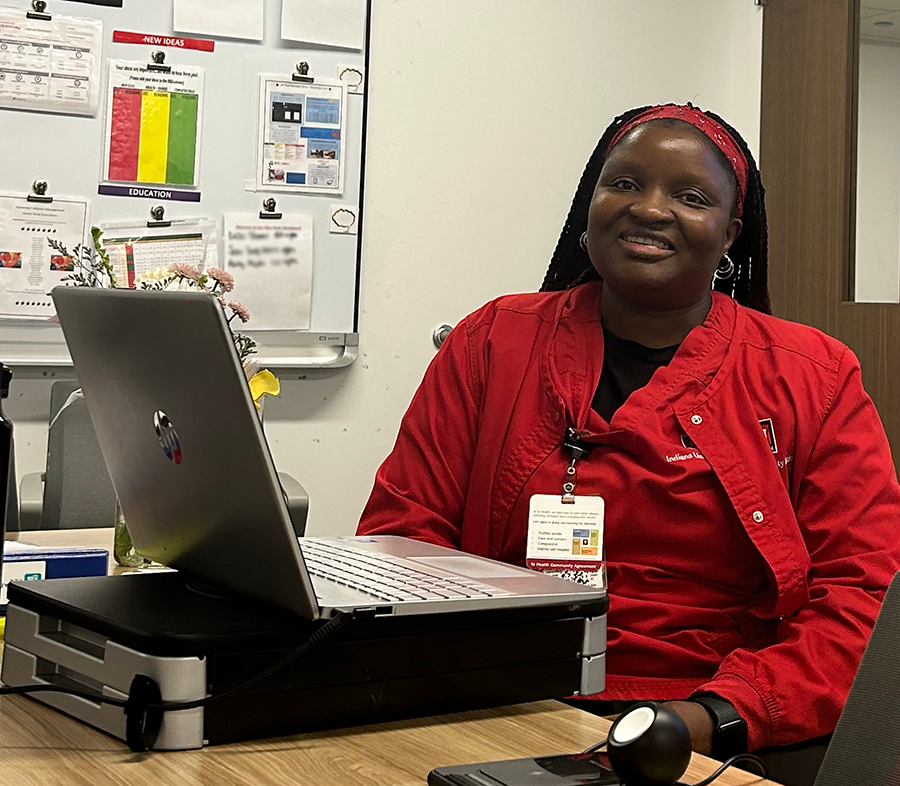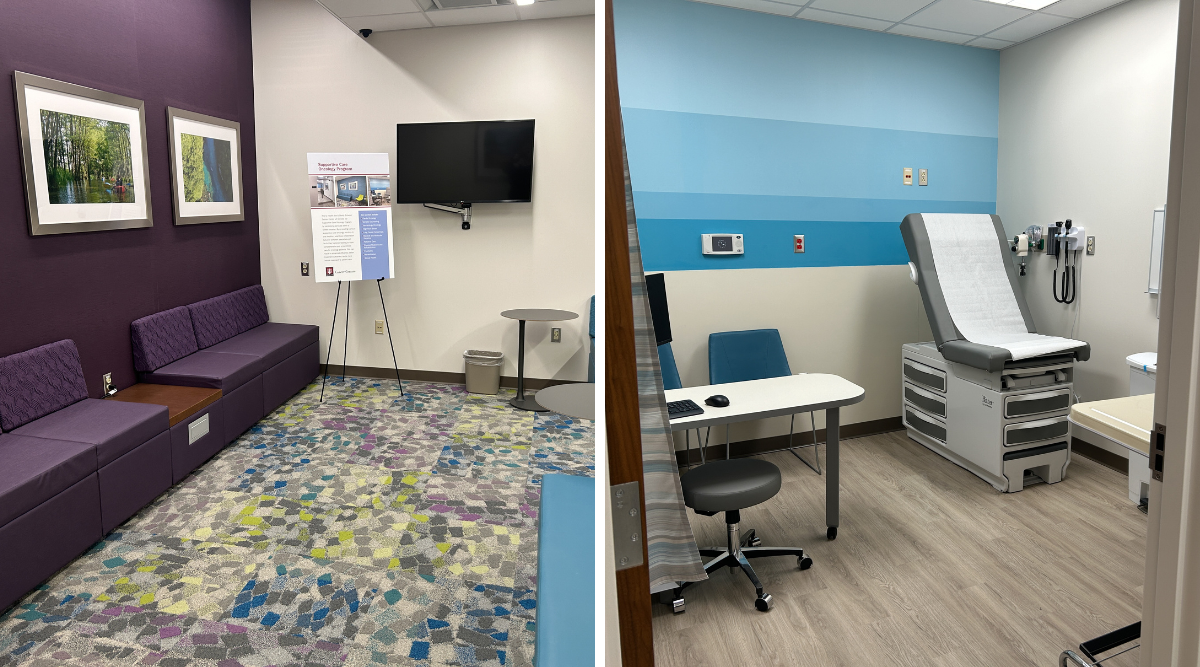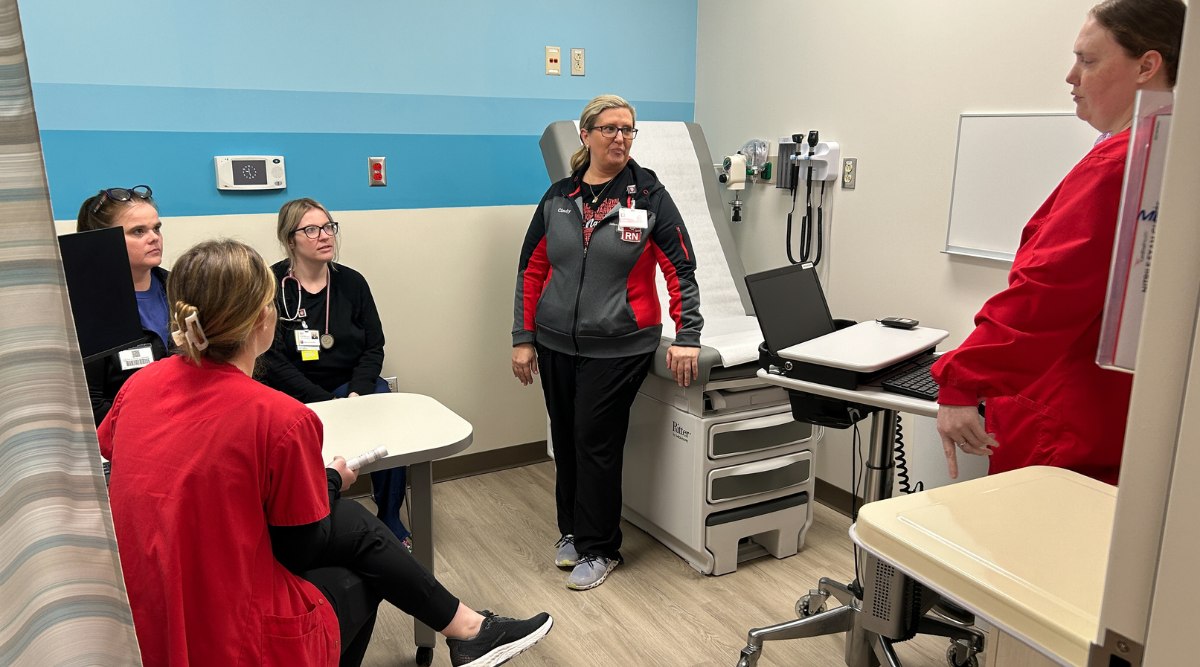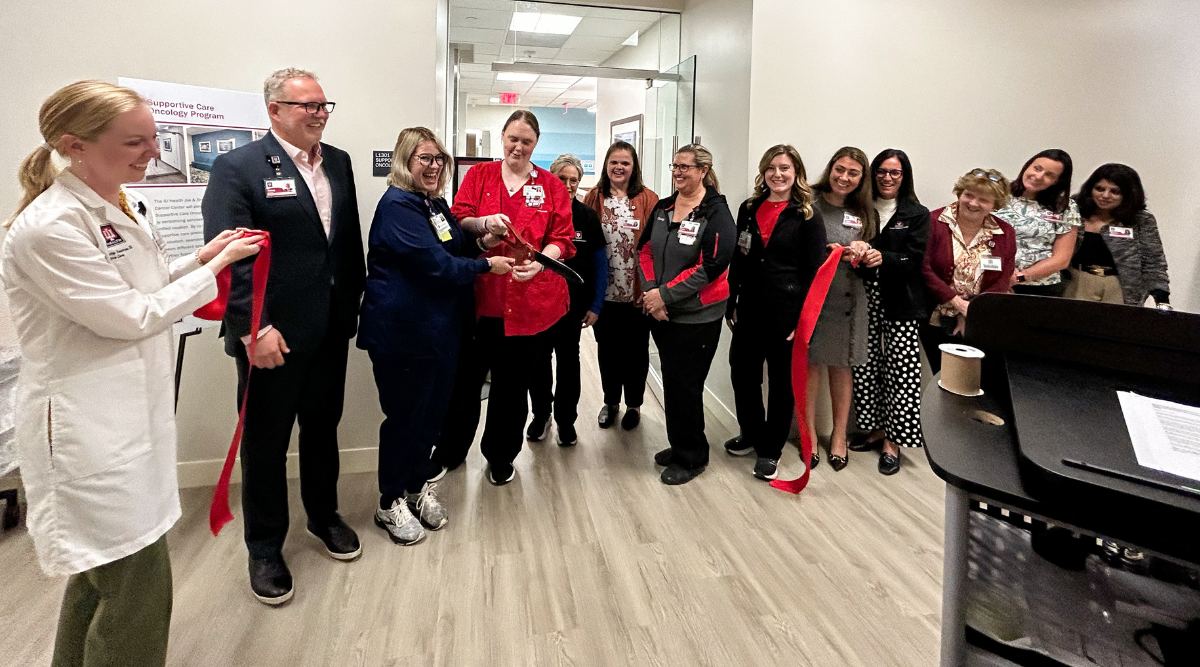When Wayne Hasell arrived at Methodist Hospital he was in agonizing pain due to a flesh-eating soft tissue infection. Surgeons were able to save Wayne’s life, but he was left with a massive abdominal wound. “It was such a big area that I didn’t want to jump to using his own skin grafts because you want to make sure that when you use the patient’s own skin that it’s really going to work,” said Rachel Danforth, an IU Health plastic surgeon. “For him I decided to use a fish skin graft, [cod from Iceland]… that requires minimal processing because there is no risk of viral transfer from this kind of fish’s skin to humans. We put it on as a temporary thing and then we applied the patient’s own skin graft on top of that.”
Navigating alcohol abuse: How to support a loved one
Written by Trisha Palencer, director of chronic pain and chemical dependency at the IU Health West Addiction Treatment and Recovery Center
April is Alcohol Awareness Month, a time to raise awareness for alcohol abuse. Many families face difficulties when a loved one struggles with alcohol abuse. Supporting someone through this journey requires empathy, patience and a multifaceted approach aimed at both the individual and their support system.
Understanding alcohol abuse
Alcohol abuse is a complex issue with multifaceted roots. It impacts not only the individual but also their relationships, work and overall well-being. Recognizing the signs, which may include increased tolerance, mood swings and neglect of responsibilities, is the first step in addressing the problem.
Open communication
Initiating open, non-judgmental conversations can pave the way for support. Express your concerns calmly, emphasizing care and understanding. Listening actively and without interruption fosters trust and encourages your loved one to share their struggles.
Educate yourself
Learning about alcohol abuse, its effects, and available treatments equips you to offer informed support. Understand that addiction is a complex disease, often requiring professional intervention.
Encourage treatment
Gently encourage your loved one to seek professional help. Offer to assist in finding resources, whether it’s counseling, therapy, support groups or an addiction treatment program. Highlighting the benefits of seeking help can alleviate the fear and stigma often associated with treatment.
Establish boundaries
Setting clear boundaries is crucial for both your well-being and that of your loved one. Enabling behaviors, such as covering up their actions or making excuses for them, can perpetuate the cycle of abuse. Express your support while maintaining boundaries that safeguard your own mental and emotional health.
Practice self-Care
Supporting someone with alcohol abuse can be emotionally taxing. Engage in self-care activities to recharge and maintain your own well-being. Seek support from friends, family, or professional counselors to navigate your own emotions and challenges.
Stay committed
Recovery from alcohol abuse is a journey with ups and downs. Stay committed to supporting your loved one through this process. Celebrate their milestones and remain a pillar of encouragement during setbacks.
Encouraging hope
Remind your loved one that recovery is possible. Share stories of individuals who have successfully overcome similar challenges. Instill hope and emphasize that seeking help is a courageous step towards a healthier, fulfilling life.
Remember, while you can offer support, the decision to seek help ultimately rests with your loved one. Encouragement and support are vital, but respecting their autonomy and readiness to change is equally important. If you or someone you love is struggling with alcohol abuse, you can call the IU Health West Addiction Treatment and Recovery Center at 317.217.2711.
Patient finds mental, emotional relief through art therapy
Nancy Manuputy’s nearly 3-month hospital stay has taken a huge mental and emotional toll. “It’s just kind of destroyed my life for a while,” said Nancy, who credits art therapy for giving her something to look forward to in the hospital. “The art therapists help get your mind off of stuff… and art is theraputic, even if you’re lousy at it.”
Nurse spotlight: Nick Geminden
Nursing is not Nick Geminden’s first career… or second… or third. After his military service Nick had several jobs, but deep down always knew he wanted to help save lives and make a difference. “There’s a lot of fear in change, especially when it’s a big career change, and financially in my other jobs I was fine. It just wasn’t very fulfilling. This career doesn’t feel like a job. It feels like more of a calling.”
Finding a new home in Indiana
Nothando Sibanda, RN, grew up over 8,000 miles away from Indiana, in the remote countryside of Zimbabwe. That’s where she found herself drawn to caring for others.

“I admired the volunteers who were offering home-based care services, family planning, and midwifery,” says Sibanda. “The determination shown by the nurses conducting monthly mobile clinics for immunization and treatment of minor illnesses, and the high degree of appreciation they received from the community ignited my passion to join the nursing profession.”
She turned to Westways Staffing Services for assistance with credential evaluation, NCLEX preparation, the VISA screening process, travel arrangements, job placements and more so she could join the International Nursing Program.
And in the summer of 2022, Sibanda was warmly welcomed by the IU Health Bloomington 3W team.
“Clinical Manager Suzanne Wright, MSN, RN, Clinical Advisor Kristy Todd, RN, NPD-BC, ONC, and many of her 3W co-workers have truly enjoyed helping her acclimate to Bloomington,” says Bloomington Director of Nursing Operations Lisa Aldridge, MSN, RN. “They’ve also reaped the rewards of being around the light Nothando exudes.”
Armed with a collection of material about the Bloomington community, including the bus transit system, restaurants, schools and recreational areas, Sibanda and her family started setting down roots in their new home.
“I enjoy the peaceful neighborhood around my place of residence. The people here are ever cheerful and friendly, and I love stopping to chat with them daily when taking a walk,” she describes.
Her son and daughter have made many friends at school, and her husband, a registered nurse, recently joined the 3W team as well. Even with her busy schedule, Sibanda has pushed herself to continue her education.
“We have all been so impressed as we have watched Nothando pursue her Bachelor of Science in Nursing (BSN) while working full time on nightshift as well as taking care of her beautiful family,” says Aldridge.
With her BSN in hand, Sibanda now plans to pursue a master’s program.
“We want to congratulate Nothando on her immense accomplishments,” says Aldridge. “And we are so grateful she will transition from our International Nurse program to being a permanent IU Health team member this summer.”
“My decision to join the IU Health Bloomington 3W team permanently was driven by the desire to work with a supportive and united team,” she explains. “I want to surround myself with people who wish me well and help me grow.”
Finding compatibility: She tests blood from organ donors and recipients
There is lengthy testing to match the right organ with the right recipient. This healthcare worker is part of that process.
By TJ Banes, IU Health Senior Journalist, tfender1@iuhealth.org
She is seldom seen by patients, but Jessica Brown plays an important role in IU Health’s transplant program. From a lab located inside IU Health Methodist Hospital’s Wile Hall, Brown works alongside a team of people trained in histocompatibility.
During “Medical Laboratory Professionals Week” (April 14-20), Brown explains her specialized role.
Q: You’re having dinner with friends, how do you explain your job?
A: “I usually describe what I do as donor and recipient compatibility. I do testing for solid organ transplants. We take blood from donors and recipients and we test donor cells to recipient serum to find out if they’ll be compatible for transplant. We also follow our patients pre- and post-transplant.”
Transplant recipient-donor compatibility is based on blood type and tissue typing. Age and size are also taken into consideration. If a healthy donor is incompatible with the intended recipient, the donor may opt to be part of paired donation. Also known as “donor swap” recipient /donor pairs are matched according to compatibility.
At the end of March 2024, IU Health performed 134 pediatric and adult transplants including heart, kidney, pancreas, liver, lung and intestine. IU Health’s Transplant program is not only nationally known by the number of patients served, but also by the team members in the program. Patients come from across the country and outside the United States. In addition to qualified nurses, the team includes surgeons, physicians, social workers, transplant coordinators, financial navigators, procurement specialists, and other staff members dedicated to excellent clinical care.
Brown grew up in Kokomo and attended Western High School. She started college at IU Bloomington and transferred to IUPUI. She graduated through the School of Medicine Health Professions Program with a bachelor in Cytotechnology, a medical laboratory specialty studying cell samples from various body sites to detect cellular changes indicative to cancer.
Q: How did you get into your role with IU Health?
A: “After working for a few years I didn’t think it was the path I wanted to pursue so I went to work in a gene therapy lab at IU School of Medicine. I needed a job while I was still exploring what I wanted to do. Cytotechnology jobs here weren’t that plentiful. I accidentally fell into this job. Because of my bachelor in Cytotechnology, I was able to apply. I’d worked in a clinical lab, I knew the basics. I did specific job training for a year and then was tested and certified.”
Q: Describe your daily work routine.
A: “Well, it’s a little like a high school chemistry lab with the big black countertops. There are several bays and lots of different testing – most is hands-on, but some is working with machines. We never know when we will be needed for a transplant so we may get notified two hours before surgery or six hours before surgery. I could be putting my kids to bed and get a call.”
Q: Is this a good job for an introvert?
A: “There are 14 of us working together who are extroverted. It’s a strong work family, and when you’re on call you are never truly by yourself because someone is always a phone call away.”
Q: What do you like best about your job?
A: “The most rewarding aspect for me is following particular patients through the transplant process – both pediatric and adults.”
Brown is married and the mother of three preschool children. In her spare time, she enjoys spending time with her children and pursuing a hobby of artistically painting denim jackets.
High school senior finds “entrance to the [career] maze”
As the next generation of Indiana healthcare professionals begins to emerge, individuals like Huda, a senior at West Lafayette Junior/Senior High School, stand out as promising talents ready to tackle the challenges of the medical field. Whether volunteering at her local mosque, participating in fundraising clubs or indulging in her love for reading, she describes a schedule packed with extracurricular activities that allows little time for sleep. Huda, originally raised the United Arab Emirates (UAE), has envisioned herself in medicine since her middle school days.
Finding inspiration through anatomy
“I knew I wanted to be a doctor since seventh grade,” says Huda.
In her seventh-grade anatomy class, Huda says that she discovered her fascination with the intricacies of the human body. She explains that her competitive nature, compassionate spirit and ability to compartmentalize in stressful situations would make her a fitting candidate for a future profession as a doctor.
She has secured a spot at Purdue University for pursuing a pre-medical undergraduate degree. However, she already has some experience in the medical field thanks to her involvement in the Greater Lafayette Career Academy (GLCA).
GLCA, in collaboration with IU Health, provides high school students with hands-on experience in the medical field, going beyond mere job shadowing to offer real-world exposure.
“Since IU Health began offering clinical experience, we got hands-on experience,” says Huda. “We had the opportunity to be medical assistants.”
The academy supports multiple school corporations in Tippecanoe County and offers programs for high school students that lead to in-demand certifications for positions like certified nursing assistant (CNA), medical assistant (MA) and emergency medical technician (EMT).
Finding the entrance to the maze
Before becoming involved in her GLCA program, Huda states that she found extreme difficulty in figuring out her career path, further stressed by the prospect of having to pay for college and medical school.
“I felt so lost because I didn’t know where to start,” says Huda. “IU Health helped me find the entrance to the maze.”
Huda feels that this opportunity has been transformative. Working as a patient care assistant on the sixth floor of IU Health Arnett Hospital, she found her passion ignited and her career path illuminated. Last year, she became a Certified Medical Assistant, and she is working towards an Emergency Medical Technician certification this year.
“The fact that IU Health is willing to invest in us…is really motivating for me to pursue medicine and work for them in the future,” says Huda.
As Indiana faces projected shortages of healthcare workers, initiatives like the GLCA-IU Health partnership can help with nurturing and empowering the healthcare workforce of tomorrow.
IU Health Schwarz Cancer Center celebrates opening of new Supportive Care Oncology Suite
By Emma Avila, epackard1@iuhealth.org, writer for IU Health’s Indianapolis Suburban Region
The new space will combine multiple specialties in one convenient location for oncology patients.
The IU Health Joe & Shelly Schwarz Cancer Center opened a new space within the facility, focused on supportive care for patients. The new Supportive Care Oncology Suite will centralize services such as Palliative Care, Cardio Oncology, Genetic Counseling and many other services within one unified location. This initiative will offer patients a comprehensive ‘one-stop shop,’ facilitating integrated health support throughout their journey.
“We’re bringing many of the disciplines we already had upstairs to a new, convenient space on the first floor,” explains Ann Bredensteiner, manager of the Supportive Care Oncology Suite and Integrative Health at the IU Health Schwarz Cancer Center. “Not only does this make things convenient for the patient, but it also allows room for future growth within the cancer center.”

The new space contains five exam rooms, two consultation rooms and one combined physician work room. The suite is designed to improve seamless collaboration between different specialists, leading to more comprehensive and streamlined care for oncology patients. This can result in enhanced efficiency, better treatment outcomes and a more holistic approach to patient care.
“This space is beneficial because patients will have all of these providers in one area that’s readily available to the patients,” says Kali Harrison, nurse navigator for Palliative Care.
“It’s much more efficient for the patients to be able to get all of that care in one place,” adds Elizabeth Cox, nurse navigator for High-Risk Breast Care.
The team celebrated the April 15 opening with a ribbon cutting. The previous week, team members gathered in the new space for a Day in the Life event. The team ran through mock patient scenarios to make sure processes and procedures are efficient for patients and team members.

“There have been so many people behind the scenes who have worked very hard to bring up the space and set us up to succeed,” says Bredensteiner.
Bringing together these services will not only enhance patient access and convenience but also create space for expanding the facility’s medical oncology and surgical oncology offerings on the second floor of the cancer center. The IU Health Joe & Shelly Schwarz Cancer Center is located at 11645 N Illinois St, Carmel, IN 46032. For more information, call 317.688.4800.

Occupational therapist gives lymphedema patients better quality of life
Amy Huntsman has been an occupational therapist for the better part of 30 years. She decided to specialize in treating patients with head and neck lymphedema after helping a family member overcome the challenges that accompany that chronic condition. “It became personal and with that passion and drive in helping a family member my goal was to learn more about head and neck lymphedema.”
She’s had a lifelong passion for respiratory care
By Emma Avila, epackard1@iuhealth.org, writer for IU Health’s Indianapolis Suburban Region
Becky Camire’s lifelong passion for respiratory therapy led to her career at IU Health Tipton, where she cares for patients with lung conditions.
From age 16, Becky Camire knew she wanted to be a respiratory therapist. The drive came from seeing herself and family members struggle with asthma. She also had loved ones who dealt with smoking-related health issues.
“I knew I wanted to help people who deal with similar issues,” she says.
Camire brings more than 27 years of respiratory therapy experience to her role at IU Health Tipton, which she began almost a year ago. Before that, she worked at IU Health Methodist for almost 26 years.
When the position opened in Tipton, Camire jumped at the opportunity.
“I was looking for a change. It just happened to come up at the right time, and I said, ‘Go for it!’”
At IU Health Tipton, she works in Pulmonary Rehab three days a week and performs pulmonary function testing one day a week.
In Pulmonary Rehab, patients can exercise with Cardiac Rehab patients while Camire monitors their lungs and is available if any medical issues arise. The program is usually eight to 12 weeks.
“It is individualized, but it’s roughly 24 to 46 sessions,” she explains. “They could go a little bit longer, but it just depends on the patient”
Though some of her patients either smoke currently or have a history of smoking, Camire says she sees others who have not ever used tobacco.
“Our patient population is kind of across the board,” she explains. “We do get people who are smokers. Now, we also get post-COVID-19 lung injuries. I also get some people with asthma and some people who don’t know why they are short of breath.”
Though Camire enjoys all aspects of her job, one of her primary focuses is smoking cessation. She has taken her expertise beyond the hospital walls and is working with the local prosecutor’s office to help Tipton County teenagers who have tobacco-related infractions. She meets with the teens one-on-one to provide tobacco counseling.
Regardless of whether she is meeting with patients within the hospital or supporting others outside of the facility, that drive to assist others is what leaves her feeling fulfilled at the end of each day.
“My favorite part is helping people,” she says. “It’s part of who I am as a person.”